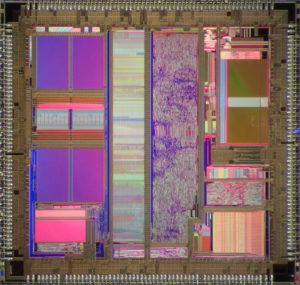Attack ATmega MCU Microcontroller Firmware from flash memory and eeprom memory, then extract the source code from its memory and copy the firmware to new Microprocessor;

Attack ATmega MCU Microcontroller Firmware from flash memory and eeprom memory, then extract the source code from its memory and copy the firmware to new Microprocessor;
The same partial decapsulation technique can be used for smartcards as well (see below figure) although not all of them would maintain electrical integrity. Very often the chip has to be decapsulated completely and then bonded onto a chip carrier. Other methods used for opening the chip packages are described in the literature and only very few of them require expensive tools.
One interesting approach suggests using an acid resistant tape to prevent the acid reacting with unwanted parts. The chip is placed on a glass to prevent lead bending and then covered with acid resistant tape. The tape over the area to be etched is cut away and the whole package is then immersed in a chemical solution to etch away the plastic. This method is limited to QFP, SOP, BGA and other thin packages.
